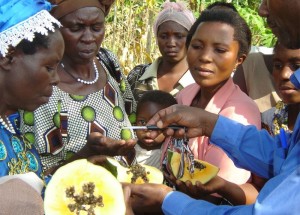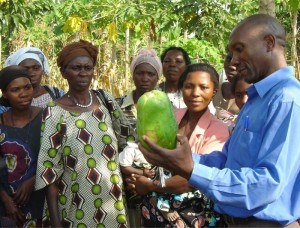Uganda/Kasese:
Growing Paw-Paw (Papaya) & Processing Papain (Latex)
There has been a high demand by the Ugandan Government as well as some private companies to produce dried latex, for use in pharmaceuticals, leather tanning and food & beer industries.
In an effort to harness this demand and help the local community, the UN Staff 1% for Development Fund has awarded the Ikongo Gender and Development Agency a grant of $4,425 towards the purchase of paw-paw seeds and technical advice, to prepare rural women (HIV/AIDS victims, orphans and single mothers) as community trainers.
The benefits of the project multiplies as the original trainers teach new people about paw-paw growing and latex processing. Once the women become experts in cultivating the fruit, papain extraction and drying, and handling and safety techniques, they train other women and men in the day-to-day skills of growing paws-paws and processing papain/latex. This generates income and helps to reduce poverty.
The first instalment of the grant supplied 500 kg. of hybrid paw-paw seeds to 50 model farmers as well as two quality paw-paw demonstration gardens with 4 solar driers. This gave the women the technical aspects of growing and processing the papain/latex that, when certified, may be used for national and international markets.
It also provided these farmers with training in papain production and enzyme extraction. They learned in detail about the plant, its uses, soil sampling, crop agronomy, planting and sawing methods, agronomic practices to paw-paws, identification and control of paw-paw pests and diseases, and finally the harvesting measures of paw-paw bananas and papain/latex.
Just four months into the project, these women have already been commissioned as focal community trainers in paw-paw-growing and maintenance. Through further demonstrations and training others on the papain/latex processing and solar construction, the project has been a resounding success within the community. Over 200 acres of paw-paw plantations have sprung up, with more and more farmers becoming interested in training — for both home consumption and commercial purposes.

